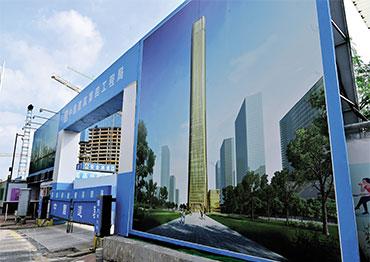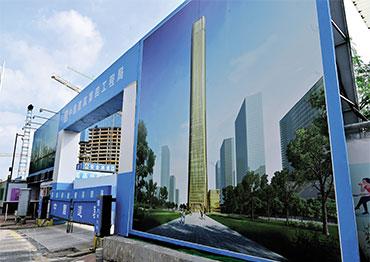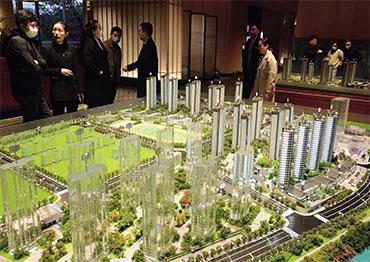In August 2022, the CBIRC, together with the Ministry of Housing and UrbanRural Development, the Ministry of Finance and the central bank put forward special loans to help the delivery of halfbuilt housing projects. The loans, which are distributed by regional governments, are limited to problematic projects. On August 29, 2022, guided by the People’s Bank of China (PBoC), the central bank, policy banks including the China Development Bank and Agricultural Development Bank of China issued loans totaling 200 billion yuan (US$28.7b) to complete existing housing projects.
On September 22, 2022, the first of the money arrived in Shenyang, Liaoning Province. By November 2022, cities including Zhengzhou, Luoyang, Kaifeng and Harbin had received the loans.
More policy tools arrived in November. On November 13, 2022, the PBoC and the CBIRC issued a 16-step guideline that encouraged commercial banks to provide complementary financial support for the property sector, which includes the timely delivery of housing projects and risk management of companies in difficulty.
On November 14, the CBIRC, the Housing Ministry and the PBoC allowed commercial banks, who are supervisors for pre-sale housing funds, to issue letters of guarantee to “high-quality developers,” those judged to be financially sound with strong profitability. These firms can withdraw up to a maximum of 30 percent of pre-sale funds to ease the cash crunch, based on their risk evaluation. But the funds should be used only for project construction and debt repayment, not to purchase more land or other investments, the notice said.
These funds are the deposits homebuyers already paid directly to developers which are held in a supervised escrow account. The funds are only supposed to be used for construction, but in some places developers were allowed to withdraw money for other purposes, such as paying workers’ salaries. This is no longer allowed. Since 2021, when the widespread misappropriation of funds was discovered, the proportion of pre-sale funds that real estate companies can withdraw depends on how much of their projects are completed.
Chen Wenjing, market research director at China Index Academy, a real estate research institution, calculated that since the start of 2022, over 110 provinces and cities either relaxed or tightened policies on the use of pre-sale funds to cope with the capital liquidity of real estate developers. “The policy’s effect is limited in the short run, as it mainly means to release liquidity for quality developers,” Chen told NewsChina.
On November 21, 2022, Pan Gongsheng, vice governor of the PBoC, announced that the bank will provide another 200 billion yuan (US$28.7b) at zero cost to six commercial banks to lend to property developers for housing completion, on top of the special funds issued earlier.
The same month, the National Association of Financial Market Institutional Investors (NAFMII), China’s interbank bond market regulator, announced it would support private enterprises, including property developers, to issue more bonds. The central bank will provide low-cost loans and support of about 250 billion yuan (US$35.9b), which can be expanded later, of bond financing by private enterprises, under the operation of professional institutes. Even though the policy does not target real estate companies, NAFMII said it has arranged China Bond Insurance, a State-owned credit enhancement company for bond issuers, to help private property companies improve their credit risk profiles, and this has worked well.
Between August and October 2022, China Bond Insurance granted guarantees to six developers to help them issue 6.8 billion yuan (US$977.1m) in bonds, according to data from China Index Academy. After the NAFMII announcement, at least three developers, Longfor Group, Medea Real Estate and Seazen Holdings, were approved to issue bonds worth 50 billion yuan (US$7.2b) in total.
Li Yujia, a researcher from the housing policy research center of Guangdong Urban & Rural Planning and Design Institute, noted that defaults by some property developers caused a deterioration in the financing environment for all developers. “Currently, there is irrational and undifferentiated risk expectation for developers that just have small problems or are relatively healthy,” Li told NewsChina, “The second prong [bond issuance guarantee] is a correction for such irrationality,” he said, referring to the government’s three-pronged package of support policies for the real estate market in obtaining credit, bond issuance and fund raising on the stock market.
On November 28, the CBIRC announced that listed property companies could again engage in mergers and acquisitions, reorganizations and equity refinancing, ending a 12-year ban. It encouraged non-publicly refinanced funds to be used for completing unfinished projects and ensuring people’s livelihoods. Industrial insiders regard it as a milestone in favorable policymaking for the sector.
The next day, shares in dozens of property-related stocks rose to the daily limits. Meanwhile, several property developers, including some leading ones, were quick to raise funds through new share sales. On December 1, 2022, Vanke, a large real estate developer, said its majority shareholder was proposing to issue new shares worth no more than 20 percent of the company’s total share capital.
According to Kuang Weida, a professor at the Renmin University of China specializing in real estate research, equity financing allows more financing opportunity for listed real estate-related companies and will help smooth the delivery of housing projects. “Some listed developers can also engage in the merger and reorganization of small- and medium-sized companies to optimize the resource distribution in the market,” Kuang told Beijing Youth Daily in a December interview, predicting a small wave of mergers and acquisitions to come.
“With the release of the three-prong approach – supportive financing policies in credit, bonds and equity – and the optimized management of pre-sale funds, the credit risks of property developers and half-built developments are expected to improve significantly,” said Dongxing Securities in an analysis published on December 5, 2022.

 Old Version
Old Version


